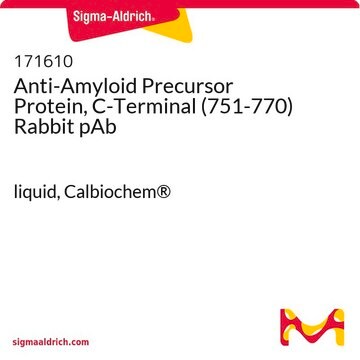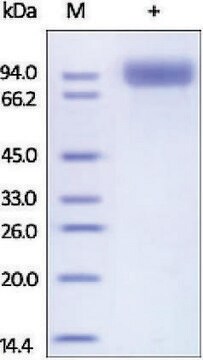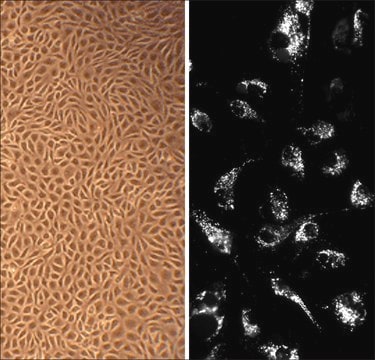A8967
Anti-Amyloid Precursor Protein, N-Terminal antibody produced in rabbit
IgG fraction of antiserum, buffered aqueous solution
Synonym(s):
Anti-APP
About This Item
Recommended Products
biological source
rabbit
Quality Level
conjugate
unconjugated
antibody form
IgG fraction of antiserum
antibody product type
primary antibodies
clone
polyclonal
form
buffered aqueous solution
mol wt
antigen 95-100 kDa
species reactivity
human, rat, mouse
technique(s)
immunohistochemistry (formalin-fixed, paraffin-embedded sections): 1:200 using formic acid-treated sections of human Alzheimer′s disease (AD) brain
microarray: suitable
western blot: 1:1,000 using rat brain extract or supernatant of 293T cells secreting APP.
UniProt accession no.
shipped in
dry ice
storage temp.
−20°C
target post-translational modification
unmodified
Gene Information
human ... APP(351)
mouse ... App(11820)
rat ... App(54226)
General description
Immunogen
Application
- western blotting
- immunostaining
- immunofluorescence
Immunofluorescence (1 paper)
Biochem/physiol Actions
Physical form
Disclaimer
Not finding the right product?
Try our Product Selector Tool.
Storage Class Code
10 - Combustible liquids
WGK
nwg
Flash Point(F)
Not applicable
Flash Point(C)
Not applicable
Certificates of Analysis (COA)
Search for Certificates of Analysis (COA) by entering the products Lot/Batch Number. Lot and Batch Numbers can be found on a product’s label following the words ‘Lot’ or ‘Batch’.
Already Own This Product?
Find documentation for the products that you have recently purchased in the Document Library.
Customers Also Viewed
Our team of scientists has experience in all areas of research including Life Science, Material Science, Chemical Synthesis, Chromatography, Analytical and many others.
Contact Technical Service








